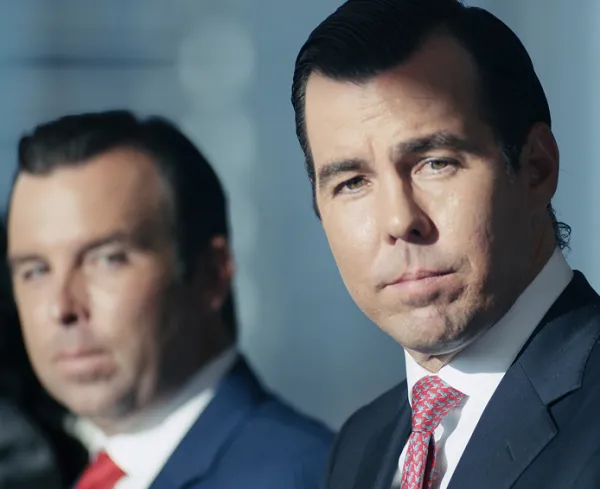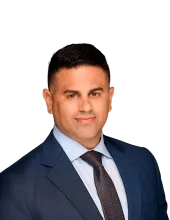
We fight for brain injury victims.
Brain injuries can be life-altering. We fight to uncover negligence and seek justice.
Start Your ClaimThe attorney shown above may not be licensed in your state. To find an attorney licensed in your area, please visit our attorney page.

The attorney shown above may not be licensed in your state. To find an attorney licensed in your area, please visit our attorney page.
Meet Our Brain Injury Attorneys
Our attorneys fight for brain injury victims, securing compensation for medical care, lost wages, and future well-being. Let us help you down the path to recovery and rebuilding your life.
The attorneys shown in these photos may not be licensed in your state. To find an attorney licensed in your area, please visit our attorney page.
Our Results
Results may vary depending on your particular facts and legal circumstances.
Ways We Can Help
Diffuse Axonal Injury (DAI)
Penetrating Brain Injury
Anoxic Brain Injury
In Their Words
Based on select nationwide reviews.
Brain injury cases need three things.
Proof of negligence
Medical documentation
Demonstrable damages
Understanding Your Brain Injury Rights
Brain injuries can have life-altering consequences. Learn more about the causes, impact, and how to seek justice for a brain injury.
Fighting For the People
Backed by America’s Largest Injury Law Firm.
$25 Billion
Recovered for clients
nationwide700,000+
Clients and families
served1,000+
Attorneys across
the country1
Click may change your life

The attorney featured above is licensed in Florida. For a full list of attorneys in your state please visit our attorney page.
Results may vary depending on your particular facts and legal circumstances.
Incidents That May Cause Brain Injuries
Learn More
Injured and not sure what to do next?
We'll guide you through everything you need to know.
Get answers to commonly asked questions about our legal services and learn how we may assist you with your case.
What is a Traumatic Brain Injury (TBI)?
A Traumatic Brain Injury (TBI) is a type of brain injury that occurs when an external force causes damage to the brain. It can result from various incidents such as car accidents, falls, sports injuries, or violent assaults. The severity of a TBI can vary widely, from a mild concussion to a more severe injury that causes long-term disability or even death.
TBIs are typically classified into three categories:
- Mild TBI (Concussion): The most common type, where a person may lose consciousness briefly or not at all. Symptoms often include headaches, confusion, dizziness, light sensitivity, irritability, or nausea, among other symptoms, but may not be immediately apparent.
- Moderate TBI: A person may lose consciousness for an extended period, and symptoms can include significant confusion, memory problems, and difficulty with coordination or speech.
- Severe TBI: This can cause long-lasting or permanent brain damage. Loss of consciousness for an extended period or a coma is common, and patients often experience significant cognitive, motor, and emotional challenges.
Symptoms of TBI can vary depending on the injury's severity and the area of the brain affected. Common symptoms include headaches, memory problems, difficulty concentrating, changes in mood, dizziness, and sometimes sensory issues like blurred vision or ringing in the ears.
TBIs can lead to a variety of long-term effects, including cognitive impairments, difficulty with motor skills, emotional changes, and even personality shifts. Treatment typically involves medical intervention to stabilize the injury, followed by rehabilitation to help the individual regain function and adapt to any lasting changes.
What should I do if I suspect I have a brain injury after an accident?
If you believe that you are exhibiting any symptoms following a trauma, it’s important to take immediate action to ensure your health and safety. Here’s what you should do:
Seek Medical Attention Right Away
Even if symptoms seem mild or develop later, you should see a doctor as soon as possible. A healthcare professional can assess your condition and order necessary tests, such as a CT scan or MRI, to diagnose the injury accurately. Delaying care can result in complications or worsen the injury.
Monitor Your Symptoms
Keep track of any symptoms you experience, including headaches, dizziness, confusion, nausea, blurred vision, memory problems, or mood changes. Be aware that symptoms may not appear immediately after the accident and could worsen over time.
Avoid Physical Activity
Refrain from engaging in strenuous activities until you receive medical advice. Physical exertion may worsen your symptoms or delay recovery, especially if you have a concussion or other form of mild TBI.
Rest and Recover
Give your brain time to heal by getting plenty of rest. This includes both physical rest (avoiding activities like exercise) and mental rest (limiting screen time and activities that require focus, like reading or working).
Avoid Alcohol and Drugs
Do not consume alcohol or recreational drugs while recovering from a brain injury, as these substances can interfere with healing and worsen symptoms.
Notify Your Employer or School
If your injury affects your ability to work or attend school, inform your employer or school administrators. Depending on the severity, they may need to make accommodations to help you recover.
Follow Up With Your Doctor
After your initial visit, it’s important to follow your doctor’s advice and attend follow-up appointments. A TBI can have long-term effects, and regular check-ups can ensure proper recovery.
Contact Morgan & Morgan
If the brain injury was the result of an accident that wasn’t your fault, it might be a good idea to consult with a personal injury lawyer. They can help determine if you are entitled to compensation for medical bills, lost wages, and pain and suffering.
What types of traumatic brain injuries does Morgan & Morgan handle?
Morgan & Morgan handles a variety of Traumatic Brain Injury (TBI) cases, advocating for victims who have sustained injuries due to the negligence of others. Here are some common types of TBIs that the firm may handle:
- Concussions (Mild TBI):
The most common type of brain injury, concussions often result from blows to the head, falls, or accidents like car crashes. While many people recover fully from concussions, some may experience lingering symptoms that affect daily life, such as headaches, dizziness, and difficulty concentrating. - Contusions (Bruises to the Brain):
A contusion is a bruise on the brain tissue caused by a blow or impact. It can lead to swelling and bleeding in the brain, requiring prompt medical treatment to prevent further damage. - Coup-Contrecoup Injuries:
This type of injury occurs when the brain is jolted and strikes the inside of the skull at both the point of impact (coup) and on the opposite side (contrecoup). This can lead to widespread brain damage and is common in car accidents or falls. - Diffuse Axonal Injury (DAI):
DAI occurs when the brain experiences a violent shaking or twisting motion, causing the brain’s nerve fibers (axons) to tear. This type of injury is often seen in high-speed collisions, such as car accidents, and can result in severe, long-term impairment or even coma. - Penetrating Brain Injuries:
These occur when an object, such as a piece of metal or glass, penetrates the skull and enters the brain tissue. Penetrating injuries can cause significant damage, often leading to cognitive, motor, and emotional deficits. - Brain Hemorrhages (Bleeding):
A brain hemorrhage occurs when a blood vessel in the brain bursts, leading to internal bleeding. This type of injury can be life-threatening and requires immediate medical attention to prevent further complications. It may result from a serious fall or a high-impact accident. - Subdural Hematoma:
A subdural hematoma is a collection of blood between the brain and its outer covering. It often results from a head injury, and the buildup of blood can increase pressure on the brain, leading to serious complications. - Epidural Hematoma:
This occurs when blood collects between the skull and the outer layer of the brain, typically after a head injury. It can lead to rapid brain swelling and requires immediate surgical intervention to avoid life-threatening consequences. - Chronic Traumatic Encephalopathy (CTE):
Although more commonly associated with repeated head trauma (such as in athletes or military personnel), CTE can also result from a single severe TBI. It causes long-term cognitive decline, memory problems, and mood changes and is diagnosed posthumously.
- Concussions (Mild TBI):
Who can file a traumatic brain injury lawsuit?
A Traumatic Brain Injury (TBI) lawsuit can be filed by various parties, depending on the situation and the individual’s circumstances. Here’s a breakdown of who can file a TBI lawsuit:
The TBI Victim (Injured Party)
- Primary Claimant: The person who directly suffers the traumatic brain injury as a result of an accident or act of negligence is typically the primary individual who can file a lawsuit. This individual seeks compensation for damages such as medical bills, lost wages, pain and suffering, and other costs associated with their recovery or long-term care.
- Important Note: If the victim is able to do so, they must file the lawsuit within the statute of limitations for personal injury in their jurisdiction, which typically ranges from one to four years depending on the state.
Family Members (In Cases of Severe Injury or Death)
- Spouse: In cases of severe TBI where the victim cannot file a lawsuit themselves due to physical or cognitive impairments, a spouse may file a lawsuit on their behalf, particularly for claims related to loss of companionship or emotional distress.
- Parents: In cases involving minors, parents or legal guardians can file a TBI lawsuit on behalf of their child, seeking compensation for medical treatment, future care, pain and suffering, and any other damages.
- Children: If the TBI victim is deceased, their children (or other family members depending on the situation) may file a wrongful death lawsuit. This lawsuit may seek damages for loss of support, funeral costs, and other related expenses.
Legal Guardians or Conservators
- Guardianship: If the TBI victim is incapacitated and cannot manage their own legal affairs due to the severity of the injury (e.g., being in a coma or having severe cognitive impairments), a legal guardian or conservator may be appointed to file the lawsuit on their behalf.
Estate Representatives
- Executor of the Estate: In the tragic event that the TBI victim passes away due to their injury, the executor or administrator of the estate may file a wrongful death lawsuit on behalf of the deceased. This is typically done by the person designated in the victim’s will or by the court if no will exists.
Third Parties (In Special Circumstances)
In some cases, third parties who may have witnessed the injury or have suffered harm due to the TBI (such as a spouse or parent witnessing the victim’s suffering) might be able to file for loss of consortium or emotional distress damages, though this varies by jurisdiction.
What are the signs and symptoms of brain injuries?
Signs and symptoms of a brain injury can vary depending on the severity and type of injury (mild, moderate, or severe). Some symptoms may appear immediately, while others can develop over hours or days. Here are common signs and symptoms to watch for after a head injury:
Physical Symptoms
- Headache: A persistent or severe headache is one of the most common symptoms after a brain injury.
- Nausea or Vomiting: Feeling nauseous or vomiting, especially after a blow to the head, could indicate a concussion or more severe injury.
- Dizziness or Balance Problems: Difficulty with coordination or walking, feeling lightheaded, or having trouble maintaining balance.
- Fatigue or Drowsiness: Feeling excessively tired, lethargic, or struggling to stay awake.
- Sensitivity to Light or Noise: Increased sensitivity to bright lights or loud sounds, often seen with concussions or mild TBIs.
- Blurred Vision or Double Vision: Difficulty seeing clearly or experiencing double vision.
- Ringing in the Ears (Tinnitus): Hearing ringing, buzzing, or other noises in the ears.
- Seizures: In more severe brain injuries, seizures or convulsions may occur.
- Loss of Consciousness: A brief or prolonged loss of consciousness after an impact or injury to the head.
- Swelling or Tenderness at the Injury Site: Bruising or swelling around the head, face, or neck area.
Cognitive Symptoms
- Confusion or Disorientation: Feeling "foggy," confused, or having trouble focusing. This can include difficulty remembering important information or events right before or after the injury.
- Memory Loss (Amnesia): Difficulty remembering things, especially immediately before or after the injury.
- Difficulty Concentrating or Thinking Clearly: Trouble staying focused, thinking through tasks, or processing information.
- Slow Thinking or Processing: A noticeable delay in response times or difficulty following conversations.
Emotional and Behavioral Symptoms
- Mood Swings: Irritability, frustration, or experiencing sudden emotional changes.
- Anxiety or Depression: Feelings of anxiety, depression, or overwhelming sadness, which may be a result of the injury or a change in brain function.
- Personality Changes: A noticeable shift in behavior, such as becoming more impulsive, withdrawn, or exhibiting uncharacteristic aggression.
- Sleep Disturbances: Trouble falling asleep, staying asleep, or sleeping too much. Some individuals may also experience disturbed sleep cycles.
Severe Symptoms (Emergency Signs)
- Severe Headache or Worsening Pain: If a headache becomes progressively worse, it could signal swelling or bleeding in the brain.
- Loss of Consciousness for an Extended Period: Prolonged unconsciousness, confusion, or a coma after an injury is a serious sign of a severe brain injury.
- Weakness or Numbness in Limbs: Loss of strength or feeling on one side of the body, or difficulty moving a limb, may indicate nerve damage or brain injury.
- Clear Fluids or Blood Leaking From the Nose or Ears: This could be a sign of a skull fracture or other severe injury.
- Slurred Speech or Difficulty Speaking: Trouble speaking, slurred speech, or difficulty understanding language.
- Uncontrolled Bleeding or Bruising: Profuse bleeding or bruising around the head or face, particularly if accompanied by symptoms of confusion or dizziness.
Children and Infants
For young children or infants who cannot express their symptoms, look out for signs like:
- Excessive crying or irritability
- Change in eating or sleeping patterns
- Bulging soft spot (fontanel) on an infant’s head
- Changes in behavior, such as lethargy or less interaction than usual
- Loss of balance or trouble walking
When to Seek Medical Attention
If you or someone else exhibits any of the following signs after a head injury, it's critical to seek immediate medical help:
- Persistent or worsening headaches
- Seizures
- Loss of consciousness (even briefly)
- Severe confusion or disorientation
- Difficulty breathing or swallowing
- Clear fluid draining from the ears or nose
- Unexplained vomiting or worsening nausea
- Any other unusual or severe symptoms
If you suspect a brain injury, even mild, it's always better to be cautious and consult a healthcare professional. Early diagnosis and intervention can help prevent long-term complications and improve recovery outcomes.
What are the common causes of traumatic brain injuries?
Traumatic Brain Injuries (TBIs) can result from a variety of accidents or incidents, typically involving a sudden blow or jolt to the head that causes damage to the brain. Here are some of the common causes of TBIs:
Motor Vehicle Accidents
Collisions involving cars, trucks, or motorcycles are a leading cause of TBIs. The impact of a crash can cause the brain to hit the skull or be violently shaken.
Airbag deployment can also be a contributing factor. There can be multiple points of impact to the head during a car accident. For instance, the head can strike the interior of the vehicle and then receive a second blow from the airbag. There may also be an acceleration/deceleration motion of the head (whiplash) followed by airbag deployment that can cause mTBI symptoms.
When pedestrians are struck by vehicles, it can lead to serious head injuries, especially if the person is thrown to the ground or strikes their head on the road or vehicle.
Bike riders involved in crashes are also at high risk for TBIs, especially if they are not wearing helmets.
Falls
Falls are a leading cause of TBIs, particularly among the elderly and young children. Falling from a height, such as from ladders, stairs, or playground equipment, can cause the head to be severely struck and can lead to serious brain injury.
Construction workers and others in hazardous jobs are particularly vulnerable to falls from heights or accidents involving machinery.
Sports Injuries
Sports such as football, soccer, hockey, and boxing are high-risk activities for TBIs due to collisions, falls, or being struck in the head with equipment (a ball, puck, or bat).
Injuries can also occur in non-contact sports such as gymnastics, cycling, or skateboarding when the athlete falls or suffers an impact to the head.
Violence and Assaults
Violent crimes, including assaults where the victim is struck on the head or involved in a fight, can cause TBIs. This can include blows with fists, weapons, or other objects.
Penetrating injuries from firearms can lead to severe brain damage and are among the most serious causes of TBI.
Military and Combat Injuries
Military personnel are at risk for TBIs from explosions, landmines, or shrapnel during combat. The shockwave from blasts can cause brain injuries even without direct impact.
Soldiers may also suffer head injuries from blunt force trauma or accidents during training or combat.
Workplace Accidents
In industries where workers are exposed to heavy machinery, tools, and equipment, falls, collisions, or being struck by falling objects can cause serious head injuries.
Farm workers face risks of TBIs from accidents involving tractors, animals, or falls from heights.
Diving or Water-Related Accidents
Diving accidents where a person strikes their head on the bottom of a pool, lake, or ocean can lead to TBIs, especially when hitting the water at high speeds.
Colliding with underwater obstacles or other swimmers can also cause brain injuries.
Slips and Falls in the Home
Slips in the shower or bathtub are common causes of TBIs, especially in older adults who may have difficulty maintaining their balance.
Falling down stairs in the home can lead to head injuries, particularly when the person loses their balance and falls backward.
Childhood Accidents
Young children, especially toddlers, are prone to falls from playground equipment, furniture, or during playtime, which can result in head injuries.
Children riding bicycles without helmets are at high risk for head injuries when involved in accidents.
Medical Malpractice
Errors during surgery, particularly brain or spinal cord procedures, can result in TBIs.
In some cases, medical negligence, such as failing to diagnose a brain injury early, can lead to worsening of the injury and long-term damage.
Domestic Violence
Victims of domestic violence, especially women and children, are at risk for head trauma caused by being struck or beaten. These injuries can cause long-lasting brain damage.
TBIs can occur in a wide variety of settings and situations, often unexpectedly. It’s important to seek immediate medical attention if you suspect a brain injury to prevent complications and improve recovery chances.
If the injury was caused by the negligence or recklessness of others, consulting with an experienced attorney can help you understand your legal options for compensation.
Who can be held responsible for brain injuries?
When a traumatic brain injury (TBI) occurs due to someone else’s negligence or wrongdoing, various parties may be held legally responsible. Determining liability depends on how the injury happened and who had a duty of care to prevent harm. Below are some of the potentially liable parties in a TBI case:
Negligent Drivers & Vehicle Owners
If a TBI was caused by a car, truck, motorcycle, bicycle, or pedestrian accident, the at-fault driver may be held responsible.
Employers of commercial drivers (trucking companies) can also be liable if an employee caused the crash while on the job.
Property Owners & Businesses
If a slip and fall accident or another premises-related injury led to a TBI, the property owner or business may be liable under premises liability laws.
Examples include unsafe stairs, poor lighting, wet floors, and falling objects in stores, restaurants, workplaces, and apartment buildings.
Employers & Companies (Workplace Accidents)
Employers can be responsible for TBIs if unsafe workplace conditions contributed to the injury. In construction and industrial jobs, workers may suffer head injuries due to falling debris, defective machinery, or unsafe scaffolding.
Workers' compensation may cover medical costs and lost wages, but a third-party lawsuit may be possible if negligence from another company (subcontractors, equipment manufacturers) played a role.
Sports Organizations & Schools
Schools, colleges, and professional sports leagues may be liable if coaches, trainers, or organizations fail to protect athletes from concussions or TBIs.
Inadequate safety protocols, failure to provide proper helmets, and allowing players to return to play too soon after a head injury can lead to liability.
Manufacturers of Defective Products
If a faulty helmet, airbag, seatbelt, or other defective product contributed to a brain injury, the manufacturer could be held responsible under product liability laws.
Examples include motor vehicle defects, defective workplace safety gear, and faulty medical devices.
Medical Professionals & Hospitals (Medical Malpractice)
Doctors, nurses, and hospitals can be liable for TBIs caused by medical errors, such as:
- Surgical mistakes affecting the brain.
- Misdiagnosis or delayed diagnosis of a brain injury, leading to worsening conditions.
- Birth injuries where improper delivery techniques result in brain damage to newborns.
Property Managers & Landlords
If a tenant or visitor suffers a TBI due to unsafe living conditions (such as broken staircases, poor lighting, or lack of security leading to an assault), the landlord or property manager could be held responsible.
Perpetrators of Violence & Assault
Individuals who physically assault someone—such as in cases of domestic violence, bar fights, or armed robberies—can be held criminally and civilly liable for causing a TBI.
If the assault occurred on commercial property (a bar or nightclub with inadequate security), the business might also bear some responsibility.
Government Entities & Municipalities
If a brain injury was caused by poorly maintained roads, defective traffic signals, or hazardous public property, a city, county, or state government may be liable.
Government entities may also be responsible for police misconduct or excessive force leading to a head injury.
Nursing Homes & Assisted Living Facilities
Elderly residents can suffer TBIs due to falls, neglect, or physical abuse in nursing homes.
If staff fail to provide proper supervision or safety measures, the facility may be responsible.
If you or a loved one suffered a TBI due to someone else’s negligence, you may be entitled to compensation for medical expenses, lost wages, pain and suffering, and long-term care. Morgan & Morgan’s experienced brain injury attorneys can investigate your case, determine liability, and fight for the justice you deserve.
What is the process of filing a TBI lawsuit?
Filing a traumatic brain injury (TBI) lawsuit is a complex process that requires careful preparation, strong evidence, and experienced legal representation. Below is an overview of what to expect when pursuing a claim with Morgan & Morgan.
1. Seek Medical Attention
If you suspect a brain injury, seek medical care immediately. A diagnosis from a medical professional will not only protect your health but also serve as critical evidence in your case. Brain injuries can worsen over time, so early intervention is essential.
2. Contact Morgan & Morgan
An experienced TBI attorney can evaluate your case, determine liability, and discuss potential compensation. Morgan & Morgan offers free case evaluations, and we work on a contingency fee basis, meaning you do not pay unless we win.
3. Investigation and Evidence Collection
Building a strong case requires gathering key evidence, which may include:
- Medical records and doctors’ opinions on the severity of your injury
- Accident reports, whether from law enforcement, a workplace incident, or other sources
- Witness statements from individuals who saw what happened
- Surveillance footage, photographs, or any available video evidence
- Testimony from experts, such as neurologists or accident reconstruction specialists
4. Filing the Lawsuit
Once there is sufficient evidence, your attorney will file a formal complaint against the responsible party. This legal document outlines how the injury occurred, who is liable, and the damages being sought. After the complaint is filed, the defendant will have a set period to respond.
5. Discovery Process
During discovery, both sides exchange evidence and gather further information. This process may involve:
- Depositions, where witnesses and experts provide sworn testimony
- Interrogatories, which are written questions that the opposing party must answer
- Requests for documents, such as medical records, accident reports, or insurance policies
Discovery allows both parties to assess the strength of the case and may lead to settlement discussions.
6. Settlement Negotiations
Most TBI cases are resolved through settlement rather than trial. The attorneys on both sides will negotiate a potential agreement, often involving the at-fault party’s insurance company. The goal is to secure fair compensation for medical expenses, lost wages, pain and suffering, and other damages. Morgan & Morgan will not accept a low settlement that does not adequately compensate you for your losses.
7. Trial (If Necessary)
If a settlement cannot be reached, the case will proceed to trial. A judge or jury will hear the evidence and determine whether the defendant is liable and, if so, how much compensation should be awarded. At trial, your attorney will present expert testimony, medical records, and other evidence to prove the extent of your injury and the impact it has had on your life.
8. Receiving Compensation
If the case is won at trial or settled beforehand, you will receive compensation for damages such as:
- Medical expenses, including future care needs
- Lost income and reduced earning capacity
- Pain and suffering
- Emotional distress
- Long-term rehabilitation and disability accommodations
- Loss of enjoyment of life (impairment of daily activities & relationships)
- Punitive damages (for cases involving reckless or intentional harm)
How long do I have to file a brain injury lawsuit?
The amount of time you have to file a personal injury claim, known as the statute of limitations, varies by state and the specifics of your case. However, some exceptions may apply, such as in cases involving minors, government entities, or when the injury wasn’t discovered right away.
It's important to file your claim as soon as possible to preserve your legal rights. Failing to file within the statute of limitations could result in your case being dismissed, meaning you may lose the opportunity to recover compensation for your injuries.
Since deadlines can vary by state and situation, it's best to consult with a personal injury attorney as soon as possible after the incident to understand the specific timeline for your case. An attorney can help ensure your claim is filed correctly and on time.
Can I still file a claim if my symptoms appear weeks or months later?
Yes, you can still file a claim if your symptoms appear weeks or months after the accident. Traumatic brain injuries (TBIs) can have delayed symptoms, and it is not uncommon for victims to experience cognitive, emotional, or physical impairments long after the initial injury.
The ability to file a claim will depend on a few key factors:
1. Statute of Limitations
Each state has a deadline for filing personal injury lawsuits, known as the statute of limitations. In many states, this deadline is between two to four years from the date of the injury, but some states allow for exceptions when symptoms are delayed. If you only became aware of your brain injury later, your attorney may argue that the statute of limitations should begin from the date you discovered (or should have reasonably discovered) the injury.
2. Medical Documentation
If you did not seek immediate medical attention after your accident, it is still possible to build a case. A doctor can assess your symptoms and determine whether they are linked to the accident. Having medical records that document your symptoms and their progression can be crucial in proving that the injury was caused by the incident.
3. Proving Causation
To succeed in a TBI claim, you must prove that your brain injury was caused by the accident in question. This can be more challenging if significant time has passed, but an experienced attorney can use medical evaluations, expert testimony, and other evidence to establish a clear connection.
4. Insurance Company Challenges
Insurance companies may try to argue that your symptoms are unrelated to the accident, especially if there was a delay in diagnosis. An attorney can help counter these arguments by gathering strong medical and expert evidence to support your claim.
Morgan & Morgan Can Help
Morgan & Morgan has extensive experience handling complex brain injury cases, including those where symptoms appear later. Our legal team can review your medical records, consult with experts, and build a strong case to pursue the compensation you deserve. We work on a contingency fee basis, meaning you pay nothing unless we win.
If you have developed symptoms of a brain injury after an accident, do not wait. Contact us today for a free case evaluation to discuss your legal options.
What happens if my loved one is in a coma due to a traumatic brain injury?
If your loved one is in a coma due to a traumatic brain injury (TBI), it is a devastating and challenging situation that requires immediate medical and legal attention.
A coma is a serious medical condition that requires intensive care. Depending on the severity of the brain injury, your loved one may need:
- Emergency treatment to stabilize their condition and reduce brain swelling.
- Long-term hospitalization in a neuro-intensive care unit (ICU).
- Rehabilitation if they regain consciousness, including physical therapy, speech therapy, and cognitive rehabilitation.
If the injury was caused by someone else’s negligence—such as a car accident, workplace injury, medical malpractice, or an act of violence—you may have the right to file a traumatic brain injury lawsuit on behalf of your loved one.
If your loved one is in a coma, however, they cannot file a claim themselves. In many cases, a legal guardian, spouse, parent, or other family member can step in to pursue legal action on their behalf. If no guardian has been legally designated, you may need to petition the court to become their representative.
If your loved one does not survive the coma, you may be eligible to file a wrongful death lawsuit against the responsible party. This can help secure compensation for funeral expenses, loss of financial support, and the emotional suffering of the surviving family members.
Most importantly, an experienced legal advocate at Morgan & Morgan can assist you in navigating this complex legal process—fighting for the compensation you need and deserve.
Will my case go to trial, or can it be settled out of court?
Whether your traumatic brain injury (TBI) case goes to trial or is settled out of court depends on several factors, including the strength of your evidence, the willingness of the at-fault party to negotiate, and the complexity of your claim. Below is an overview of what to expect in both scenarios.
Settlement: The Most Common Outcome
Most personal injury cases, including TBI claims, are settled out of court through negotiations between your attorney and the defendant’s insurance company. A settlement can provide compensation without the need for a lengthy and stressful trial.
Why Settle?
- Faster resolution: Settlements typically take months rather than years.
- Lower risk: Trials are unpredictable, and a settlement guarantees compensation.
- Less stress: Avoiding court can ease the emotional and financial burden.
When a Settlement Might Not Be Possible
- The insurance company refuses to offer fair compensation for medical expenses, lost wages, and pain and suffering.
- There is a dispute over liability, and the defendant denies responsibility.
- Your damages are extensive and ongoing, requiring long-term medical care and financial support.
Going to Trial: When It Becomes Necessary
If a fair settlement cannot be reached, your case may proceed to trial. In this situation:
- Both sides will present evidence and witness testimony before a judge and jury.
- Your attorney will argue why the defendant is liable and why you deserve compensation.
- A jury will decide the case and determine how much compensation you should receive.
Why Go to Trial?
- The defendant’s offer is far too low, and a jury verdict may award higher compensation.
- The case sets an important legal precedent, such as holding a negligent company accountable.
- The defense is unwilling to admit fault, making a trial the only path to justice.
If you or a loved one has suffered a brain injury, we can evaluate your case and determine the best course of action. Contact us today for a free case evaluation to discuss your options.
What if I was partially at fault for the accident that caused my TBI?
If you were partially at fault for the accident that caused your traumatic brain injury (TBI), you may still be able to recover compensation, depending on the laws in your state. Personal injury cases operate under different comparative fault rules, which determine how your level of responsibility affects your ability to seek damages.
Most states follow one of these three approaches when determining compensation for accident victims who share some fault:
Pure Comparative Negligence
- You can recover compensation even if you were mostly at fault for the accident.
- Your total compensation is reduced by your percentage of fault.
- Example: If you were found 60% at fault and your damages total $100,000, you would receive $40,000 (after a 60% reduction).
Modified Comparative Negligence
- You can recover compensation only if you were less than 50% or 51% at fault, depending on the state.
- If you exceed this fault threshold, you cannot recover damages.
- Example: If your damages are $100,000 and you are 30% at fault, you would receive $70,000 (after a 30% reduction). However, if you were 51% at fault, you would receive nothing in a state with a 51% threshold.
Contributory Negligence
- If you are found even 1% at fault, you cannot recover any compensation.
- Only a few states follow this strict rule, including Alabama, Maryland, North Carolina, and Virginia.
How Fault Is Determined
Fault is usually determined based on:
- Police reports and accident investigations.
- Witness statements and expert testimony.
- Video footage, photos, and forensic analysis.
Insurance companies often try to shift more blame onto victims to reduce payouts. An experienced attorney can counter these tactics and minimize your degree of fault to maximize your compensation.
Even if you were partially at fault, you should not assume you are ineligible for compensation without speaking to an attorney.
Why should I hire Morgan & Morgan?
At Morgan & Morgan, our team of experienced attorneys has successfully represented countless clients in similar situations, securing millions in compensation. As the largest personal injury law firm in the country with over 1,000 lawyers nationwide, we have the resources, knowledge, and dedication to fight for your rights.
We work on a contingency fee basis, meaning you won’t have to pay unless we win your case. Morgan & Morgan believes justice should be accessible to all, so our motto is the Fee Is Free™—you only pay if we win.
Don’t bear the burden of your injuries on your own because of someone else’s negligence. Contact Morgan & Morgan today for a free case evaluation to learn more about your legal options.
Do I have to pay for a consultation with a lawyer?
No. Consultations at Morgan & Morgan are completely free. We believe everyone deserves access to legal advice, regardless of their financial situation.
Hiring one of our lawyers is easy, and you can get started in minutes with a free case evaluation on our site or by phone.
Who will be on my case team?
When you hire Morgan & Morgan, you don’t just hire a lawyer, you hire the largest personal injury law firm in the country with an army of over 1,000 lawyers and offices in all 50 states and Washington, D.C.
Your case will be handled by a dedicated team of professionals, including personal injury lawyers, paralegals, and support staff. You will be assigned a care team that includes a primary attorney who will oversee your case and ensure you receive personalized attention throughout the process.
When do I meet with my lawyer?
We love talking to our clients. You will primarily communicate with your Case Manager via telephone and email, and if you would like to speak directly with your attorney via telephone, we will make that happen by scheduling a call.
How much does it cost to hire Morgan & Morgan?
Morgan & Morgan’s lawyers work on a contingency fee basis, meaning that there are no upfront fees or expenses until your case comes to a successful conclusion. That’s right—the Fee Is Free™, and you only pay if we win.
Our fee is a percentage of the settlement or verdict amount, ensuring we are motivated to achieve the best possible outcome for you.












